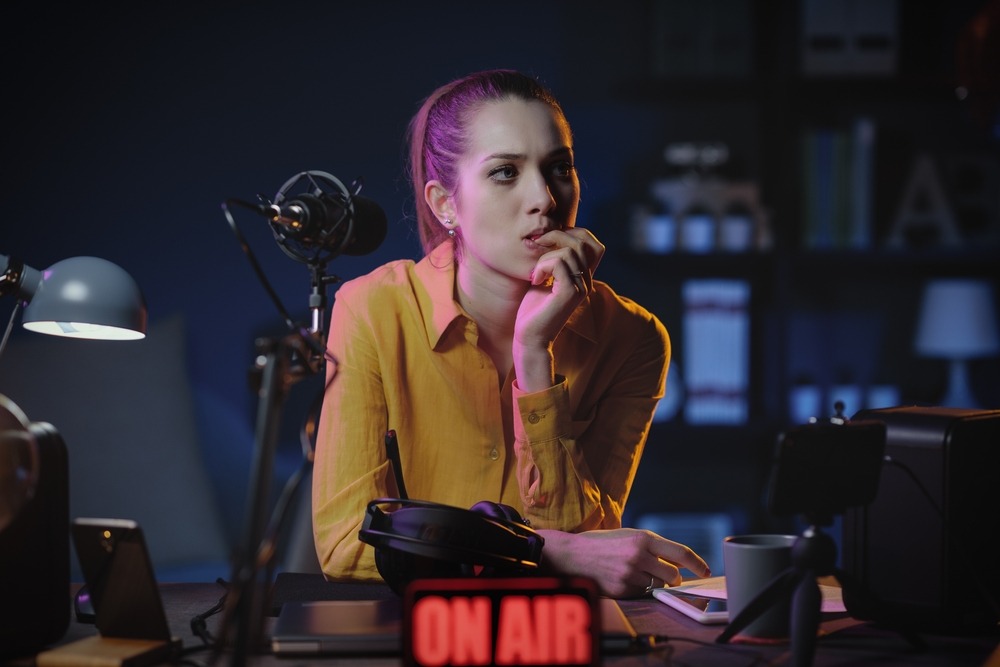
Maybe you remember the old Yogi Berra quote. The Yankee great who always had a way with words was credited with once making this brilliant observation about America’s pastime:
“90% of baseball is mental. The other half is physical.”
If you make your living talking to a hunk of glass in an air studio for several hours at a time, you might amend that to “100% of radio is mental.” Because it is.
The entire act of walking into an enclosed, sound-proofed room (often windowless), turning on a device that converts their voices into electronic signals, and talking in real time to thousands (and in some cases, millions) of people who can’t see you is an intensely cerebral, demanding activity.
It’s an amazing test of one’s skills – adlibbing, entertaining, informing, interviewing, emoting – all within carefully timed windows where the clock is always running. It requires dexterity, agility, and the ability to think on one’s feet, but not to wander into a topical danger zone.
And while it doesn’t necessary require mental wellness…
(If it did, the radio world would be mostly jock-less)
.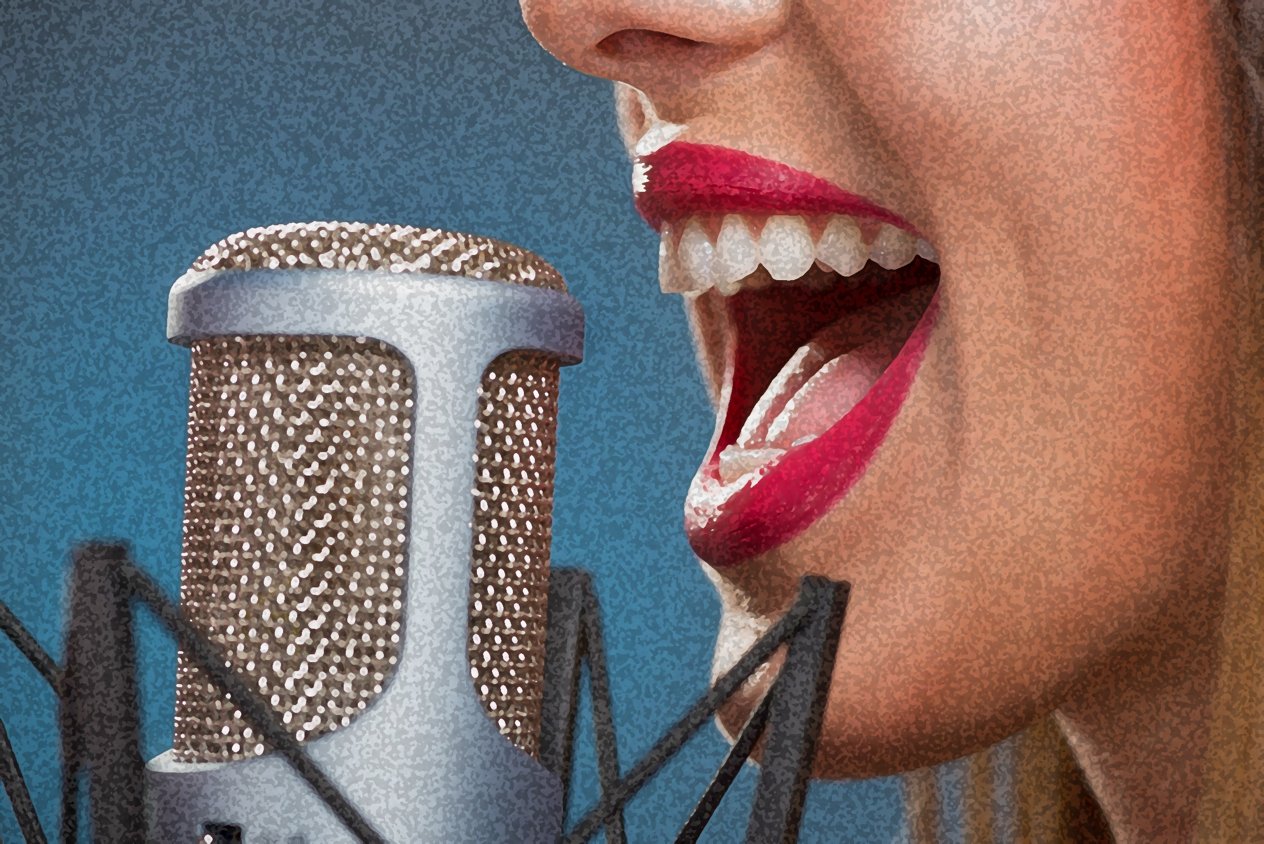 ..it most certainly helps to be in a reasonably stable place when one walks through the studio door to begin several hours of work and conversing with throngs of listeners.
..it most certainly helps to be in a reasonably stable place when one walks through the studio door to begin several hours of work and conversing with throngs of listeners.
All that came to mind this week when I read the story that Howard Stern finally emerged from his self-imposed COVID isolation to enjoy a dinner out with celebrity friends. As Stern fans know, their hero has essentially been a prisoner in his own home – or mind – throughout the pandemic. The other night, he emerged – Rip Van Winkle-like – to “enjoy” a meal in public.
Like so many entertainers, Howard has brilliantly relied on his mental quirks – self-effacement, neuroticism, obsessive compulsive disorders, to name a few – to become one of the most famous radio broadcasters ever. He has leveraged his fragile ego, his awkwardness, his sexual fears, and his insecurities to create strong connections with millions of fans over a career that now spans more than four decades, including film, television, and other media outlets.
But COVID changed him….as it changed so many of us.
I am not a psychologist, as you all know, but it is hard not to conclude COVID amplified many existing personality quirks, fears, and flaws most of us were carrying around like baggage – pre-pandemic. If you were paranoid in 2019, chances are those feelings have only intensified during the past couple years.
On its “Page Six” celebrity/gossip feature (where Howard is no stranger), this New York Post headline blared earlier this week;
“Germaphobe Howard Stern leaves ‘bunker’ to dine with pals for first time since 2020”
The Post’s intrepid reporter, Emily Smith, noted Stern had dinner with Jimmy Kimmel, Jon Hamm, Justin Theroux, Jason Bateman, and Jennifer Aniston. A fellow diner caught Stern’s coming-out:
Diners noted Howard was unmasked. He reportedly told restaurant employees it was his first night out since COVID began.
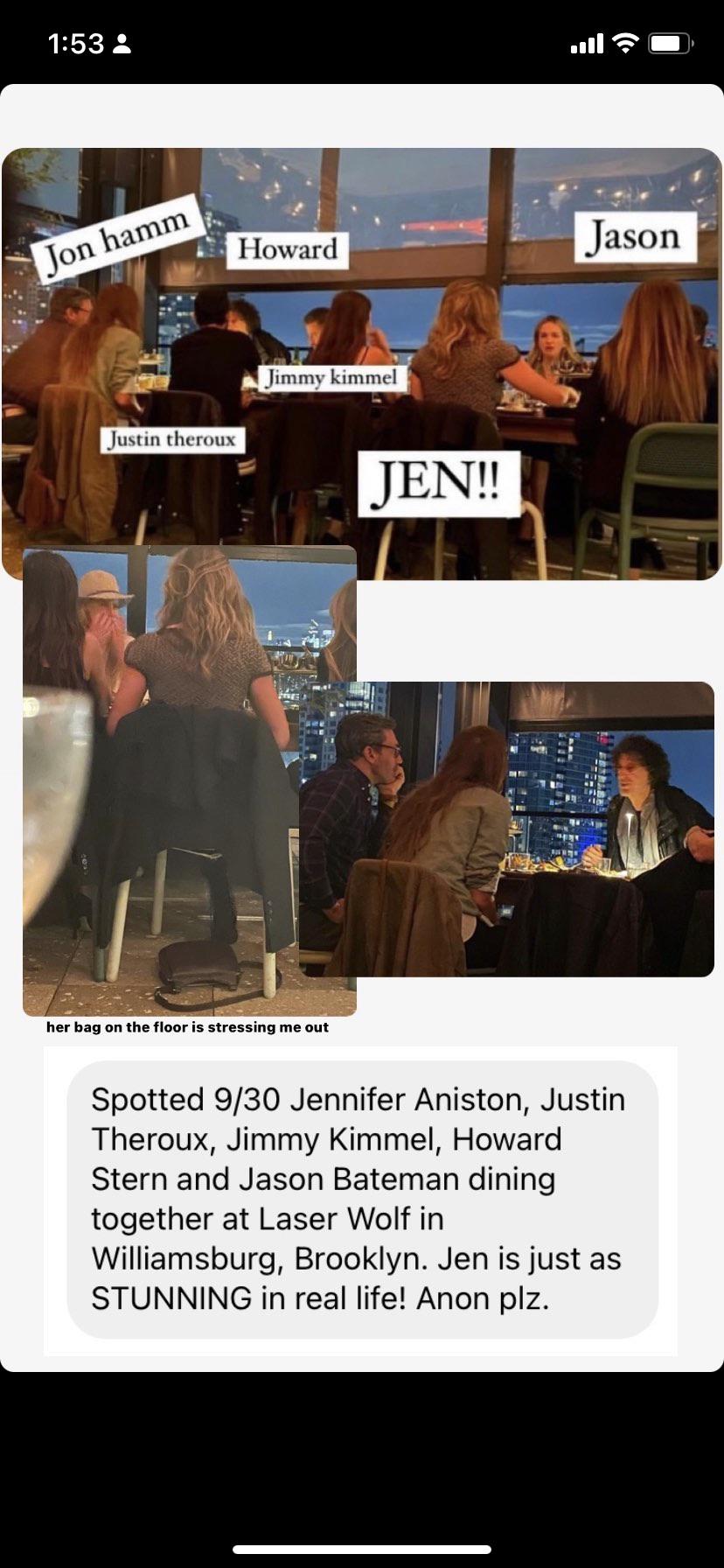
This is not a referendum on Howard’s mental health, or his struggles to cope with the pandemic. None of us knows his personal experiences nor can we imagine the pressures a star 0f his magnitude may be feeling even during so-called “normal times.”
But his battle to overcome the implications of the virus’ impact may be indicative of how many other on-air personalities have been stressed over working over the airwaves during COVID.
Of course, we’ve all been under pressure these past couple years. New reporting from NPR makes the case COVID may have actually triggered personality changes in many of us. Maggie Mertens reports a new study in the journal, PLOS One, suggests COVID has measurably altered otherwise stable people – in most cases, for the worse.
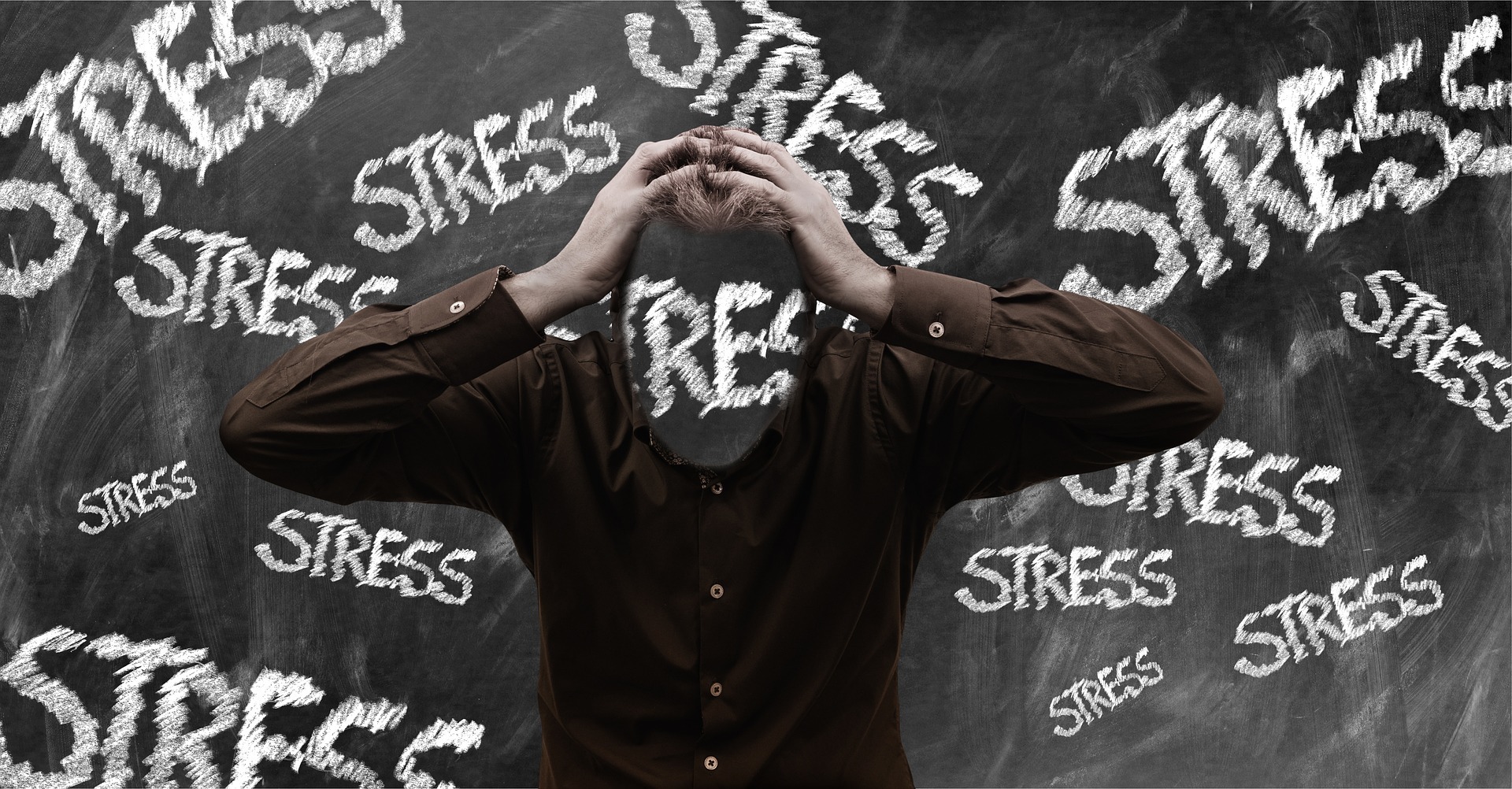 Early in the pandemic, researchers detected small, but counterintuitive behavioral changes – including less neuroticism. For many people, there was a feeling of coming together, as America enthusiastically supported its First Responders, as well as community and government efforts to manage COVID.
Early in the pandemic, researchers detected small, but counterintuitive behavioral changes – including less neuroticism. For many people, there was a feeling of coming together, as America enthusiastically supported its First Responders, as well as community and government efforts to manage COVID.
At some point in the summer, it became obvious the virus wasn’t going to “go away” anytime soon. As the pandemic became prolonged, our mental health began to fray.
In the latter stages of the pandemic, the study says the researchers noted significant “declines in the traits that help us navigate social situations, trust others, think creatively, and act responsibly. These changes have been especially pronounced among young adults.”
Dr. Joshua Johnson, an associate professor of psychology at St. Louis’ Washington University believes the scope of personality changes that took place during the 2+ years of COVID – especially among younger people – is equivalent to the shifts people experience during an entire decade of “normal” living.
We may be seeing this impact among our own on-air personalities in U.S. radio. This year’s AQ4 study asked our 700+ respondents how much they agree/disagree with the following statement about the stability of their jobs:
“As stations employ fewer people, I feel a great sense of angst and insecurity”
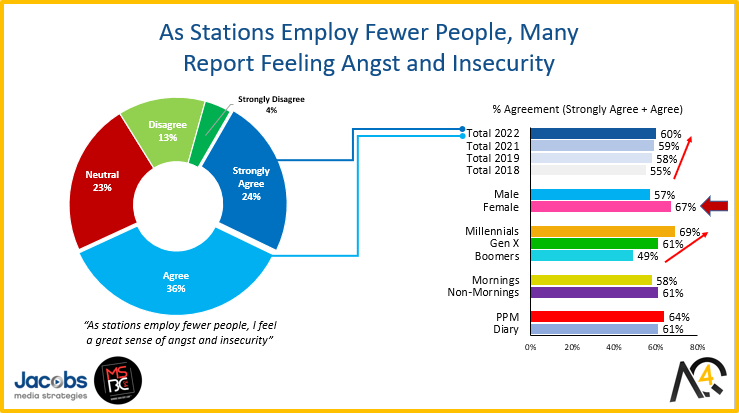
Note the upward trend over the last several surveys and the finding that younger talent and women are feeling most insecure about these times in which they’re on the radio.
We also asked our talent to rate their own mental health. While a solid majority (57%) say they’re in “excellent” or “good” shape, a concerning four in ten (43%) say their psychological well-being can be best described as “fair” or even “poor.” And yes, Millennials and women on the air are especially apt to say their mental health is suboptimal. That’s a lot of people behind the mic not feeling great about the state of their mental wellness.
Howard Stern, as is his style, is more transparent about his neuroses. After all, it’s part of his schtick. While he obviously suffers from it, he has profited from it, too.
Many other air personalities aren’t as gifted. They bury their feelings behind their upbeat, happy deliveries, always trying to make everyone’s day brighter.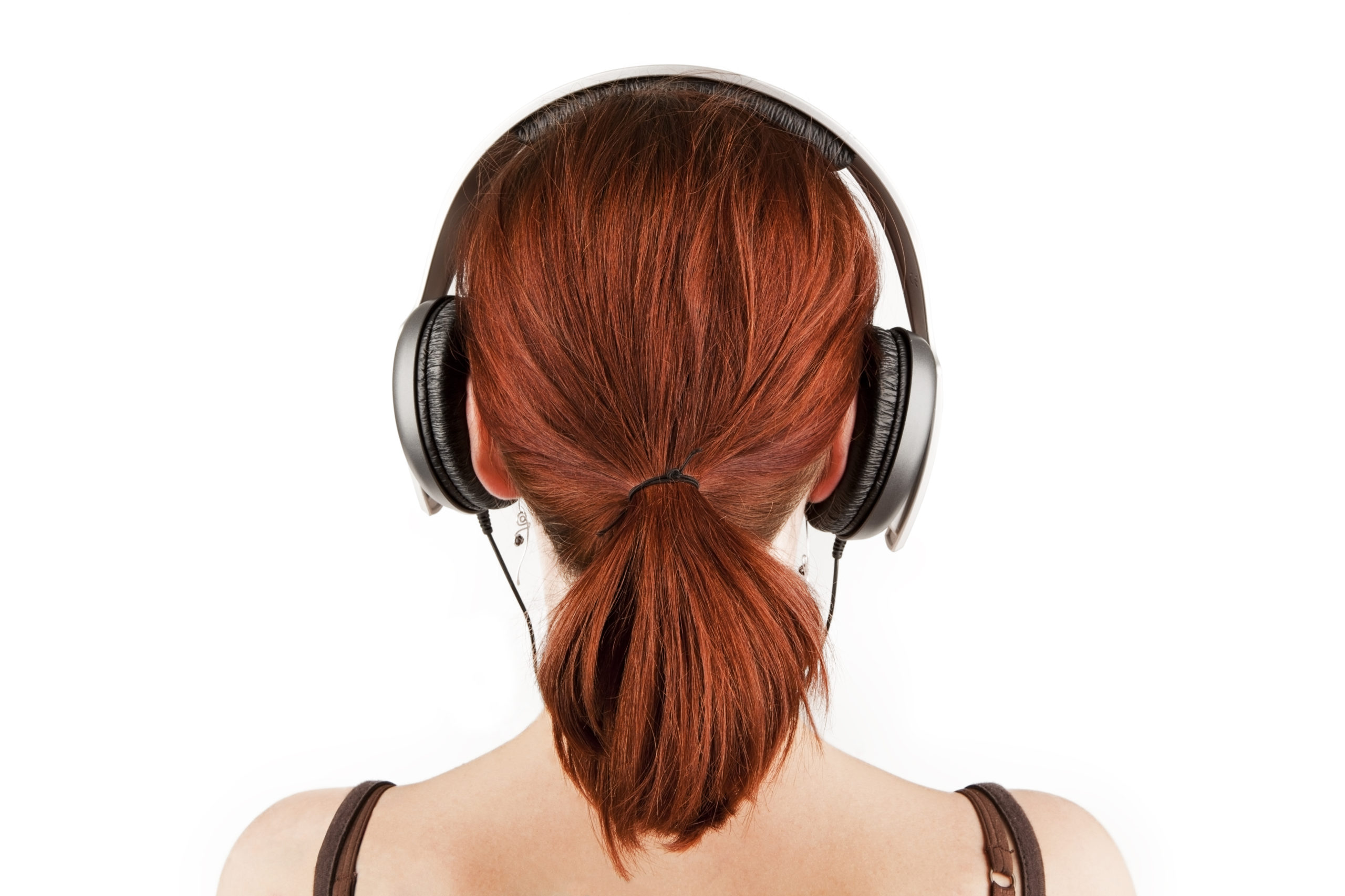
Except their own.
Radio execs would do well to recognize the behavioral shifts and growing insecurities. They may be below the surface, but the research suggests they’re omnipresent, and at times, daunting.
Offering mental health support and benefits to all station employees is a good start. If those benefits are already in place, encouraging staffers to take advantage of them might be a smart move, too. Connecting with talent and being empathetic to their needs and states of mind would also be appreciated.
Radio’s “first responders” are occupying the air studios of radio stations across the country, from New York City to Nome. And they may not be feeling their best right about now.
They need our support. And our love.
Thanks to the “master of talent,” Don Anthony.
To access the AQ4 study of commercial radio air personalities, go here.
- In Radio, You Just Never Know - April 17, 2025
- The Secret To Making A Great Podcast (And Great Radio) - April 16, 2025
- I Read The (Local) News Today, Oh Boy! - April 15, 2025




It’s the sideshow of the people you work with in radio that help Dj’s give off energy. You can tell when someone is doing a show from home.
Indeed you can.
Great Article … and Howard / Jen sighting. It’s all in the team chemistry, positive spirit and excellent energy. Proud to be building that again with real pros from a high wire above the dynamite shack at the goat yoga farm in Connecticut. It can happen from anywhere and the best is yet to come! Please stay tuned. 1220watx.com
Thanks for this, Clark.
….and the fraying on the admin staff, as they too do with less, and have always had less recognition is palpable. Admins often help keep on air folks functioning.